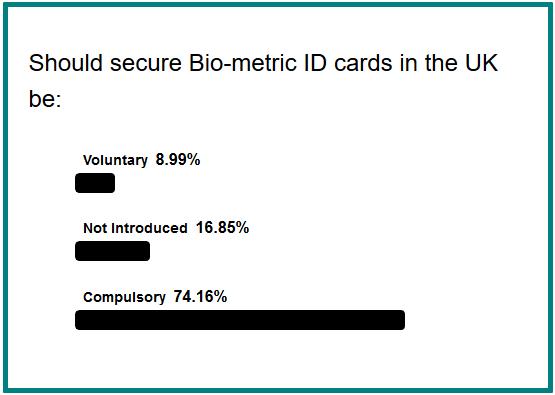Who exactly are you ?
Tim Considine
Wednesday, September 2, 2020
Proving your ID is no longer optional in many scenarios, and an official scheme is desperately needed for many reasons. The UK needs to change its position on this critical issue.

The world has changed. The UK must catch up.
Traditionally the UK has resisted introducing a national form of ID. But this is an anomaly in the modern world.
Almost every other country has an ID system for its citizens, and these days it typically includes biometric features. Why on earth would it not ? As a British citizen travelling abroad, other countries are simply bemused that we don’t have one. It’s simply incomprehensible to them. It should be incomprehensible to us also.
We could shrug because we have always done it this way. But the simple fact is WE NEED IT. And we need it urgently.
Why is ID necessary ?
Leaving aside for a moment official requirements, we cannot navigate modern life without proving our identity.
- Banks require ID to open an account.
- Online services (especially money transfer and financial services) require ID.
- Even some entertainment services and age-restricted purchases (tobacco, vaping, alcohol) require ID.
- Landlords and employers are legally obliged to verify tenant and employee identity and right to work or be here, on pain of government penalties. But they’re left to fend for themselves on how to comply.
The list goes on. We routinely surrender much personal data without a murmur. Facebook and Tesco probably know more about us than government agencies who have a clear and greater need to know even just the basics.
And what’s the big issue about being required to have an official government ID ?
HMRC dishes out National Insurance numbers with gay abandon based on rudimentary checks, precisely because they have no ID system to support their process.. And we submit without hesitation to photo ID for driving, getting on a plane, even some shop and online purchases.
Fundamentally we already accept that access to and availability of services is conditional on establishing our identity.
The vast majority of working adults today are already happy to use biometrics. Just think of your phone or Tablet with fingerprint and iris scanning. And you need it for passports and driving licences. Is it really such a leap to extend this into a National UK ID ?
Anyone under 35 will know from when they where 18 : YOU NEED I.D.
Whether it is going to the pub or buying DIY products from solvents to Stanley knives, YOU NEED I.D. Challenge 25 is now used in near all shops from paint stores to wine merchants.
Stumbling along
But this and previous governments (of all colours) stumble along, and refuse to make it required for some of the most critical parts of public services.
- Free NHS treatment is by law only available to UK residents. Hospitals struggle to control eligibility and consumption of resources by those not entitled to free care.
- People should need ID within a hospital, or admission to hospital or any medical service to ensure they are the right person before treatment and entitlement to drugs. Not only is there a public protection dimension, it should exist as a deterrent to any seeking to abuse the system.
- Immigration status : it is not easy for the police or any authority to determine quickly and reliably whether someone is a British citizen, has Indefinite Leave to Remain, has temporary residency, has overseas student status, is an over-staying visa holder …. or an illegal migrant.
- Entitlement to work : getting a National Insurance number from HMRC is trivial. But it proves next to nothing. Employers are supposed to check. How? The government offloads their responsibility by shifting it to the employer.
- Voter registration : our voter registration system is chaotic, administered with minimal checks, and subject to each local authorities' practices which vary regionally. Many authorities' registers are out of date, with people on the register who moved long ago, and who are registered multiple times.
- Vote casting : it’s simply archaic. We might as well follow India and dip voters' fingers in ink. No photo ID required (except in some local trials). Wide open to voter fraud at the polling centre. And an open invitation to manipulate the system through “bloc” postal votes. Why should one person (typically the “man of the house”) be able to control the votes of his whole household, and even of his community ? The evidence is strong that in certain communities 1 activist can control a few hundred votes.
- Terrorism : it’s hard enough maintaining watch lists and tracking those who might be likely to offend. It’s nigh-on impossible to do when there is no way to establish the identity of individuals.
- Over-population : the Office for National Statistics put the UK population in 2011 as 63.2 million, with projections for 2020 as 68 million. But many sources say that figure is an under-estimate. Various bodies such as supermarkets and waste management bodies put the figure significantly higher. Even in an obesity-prone society, there is a limit how much food you can eat or throw away, or excrete. In March 2020, DVLA put the number of active driving licences at 49.5 million. Add to that figure the number of people below the driving age, those who drive on foreign licences, those who drive illegally, and those who don’t drive. It would not be unreasonable to estimate the real population of the UK is close to 80 million. Wonder why all public resources are under strain ? Go figure, as they say.
President Trump is seeking to tackle the issue of postal voting fraud head-on. Whether you like the man or not, approve of him or not, there is simply no argument against his stance … unless you have a clear and present intention to abuse the weakness of the system to commit electoral fraud yourself or to your benefit.
The Labour Party’s arguments against voter ID are facile, specious and driven by self-interest. They hope to be the beneficiary of an inefficient and broken voting system. To be fair, they haven’t got much hope of winning any other way. So their resistance is understandable. It’s also plain wrong and borderline criminal in intent.
Government inaction
As long ago as 2005, (yes, 2005, THREE parliamentary sessions ago) the High Court judge, Judge Richard Mawrey, quashed the results of two local council elections in Birmingham after deciding there had been systematic large-scale vote rigging. He said: “The system is wide open to fraud and any would-be political fraudster knows that.”
Despite the fact the case was seen as a test case for similar incidents across the country, Tony Blair and his successors did NOTHING. Why? Because in their desperate scramble for votes, all parties benefit from the loose postal voting system. But the Labour Party is considered the primary beneficiary. Even in the recent Peterborough by-election, voting fraud was alleged to have affected the outcome. But the police and the Electoral Commission could not see what everyone saw plainly. Admiral Nelson would have been proud : “I see no fraud” with telescope firmly screwed to his blind eye.
The Daily Mail has just reported that Dominic Cummings is pushing for an ID scheme. But that doesn’t mean an end to postal voting or other abuses, and it doesn’t mean it is definitely happening. This is more likely an effort to appease public frustrations.. Once again, it is likely to be a ‘sticking plaster', rather than the fundamental reform which the Time Party advocates.
What will TIME do ?
The Time Party will :
- introduce a biometric-based National UK ID scheme as an urgent high priority
- ensure this would come under the responsibility of a new independent agency, actively banning the Home Office and HMRC from involvement in its design, development or administration (both organisations having demonstrated serial organisational and technical incompetence on many large IT-driven projects)
- require government agencies and public services to see and record ID as part of providing services
- require ID for employment and tenancies
- ban any IT contractor or developer from involvement in building the system if they have had any involvement in a failed over-budget over-time government IT contract (government, especially these agencies, appear innately unable to commisison or implement major IT systems, and large contractors take advantage of this for private gain). This should also be considered as policy for all government contracts.
- ban any IT or facilities contractor from involvement if they or their parent company have non-UK ownership over 20% (we have a wealth of UK talent)
- terminate the postal voting system with immediate effect, even in advance of a national ID scheme being operational (special arrangements would be made for those unable to vote in person through disability or absence)
- ensure that no foreign nationals entering the country would receive an ID card without criminal record checks
- ensure all foreign nationals currently in the country have their immigration status clearly recorded and trackable
- create a presumption that lack of a National UK ID card is prima facie evidence of illegal entry, a lack of entitlement to be legally in the country and a lack of entitlement to services
- create an obligation for short-term visitors to have official ID from their country (lack of papers is the biggest immigration con and abuse of the system)
- introduce a digital voting system with ID verification, authentication and “zero-knowledge” encryption
- pave the way to digital voting on key issues throughout a parliament’s term, so as to allow constituents to hold MPs to account without the need for traditional cumbersome referenda
We ran a poll on this subject :

Add your own voice, in favour or not, below.
Image by Gerd Altmann from Pixabay
If what we say strikes a chord, your help to cover our costs with the price of a coffee would be most appreciated!
<--Back to list or Previous Article or Next Article
 The Time Party
The Time Party